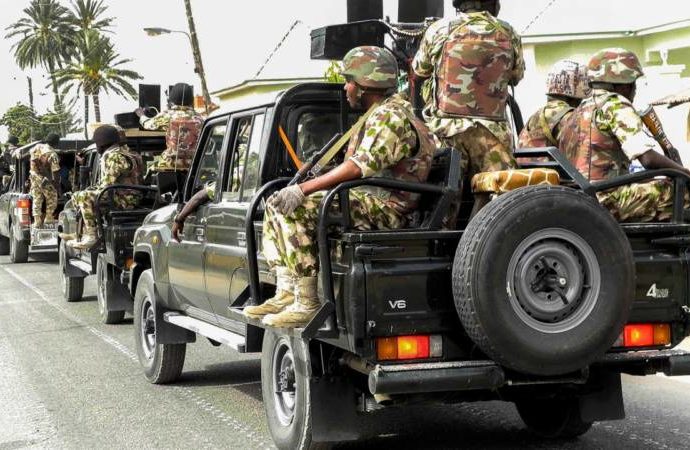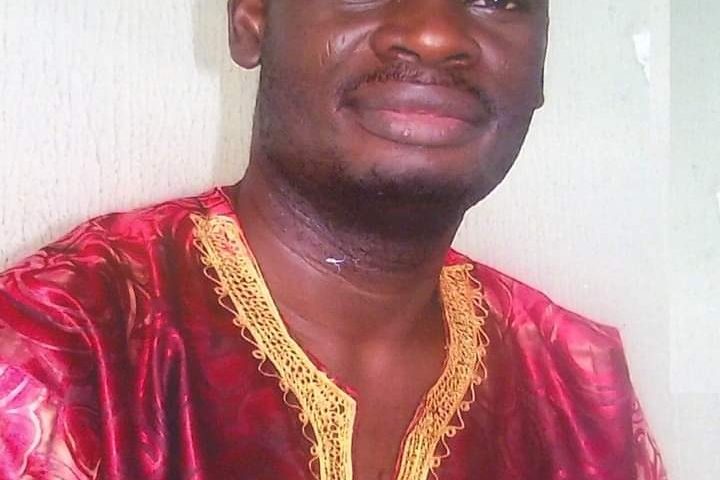By Sunny Awhefeada
The title adopted for today’s piece is a slightly modified, if not imitative, version of how someone labeled a post on facebook two days ago. The post in question is a video in which a helpless civilian was being pummeled by soldiers in uniform under the watchful supervision of a major-general! The victim is neither a terrorist nor a bandit! He is just another civilian accused by power drunk soldiers of denting the jeep of the major-general.
As the brutes in uniform rained blows on the fellow, his traumatized wife wailed drawing attention to his ill-health and how his uniformed assailants were about to blind him. That heartrending cry of the wife did not deter the soldiers. The major-general unleashed a barrage of verbal missiles on the victim.
Thankfully, someone had the presence of mind to capture that brutish act on video and sent it out for the world to see how men in uniform have become cold blooded foes to men without uniform.
Expectedly, the video was greeted with vitriol. This unacceptable act of barbarism not only deserves condemnation, but investigation by the appropriate authorities and sanctions should be dished out in good measure to the unruly and unprofessional soldiers whose creed has been “kill and go”. A Rear Admiral Arogundade also once ordered naval ratings to beat up a Miss Okereke some years ago.
Nigerians still recall the video of a youth corps member being bathed with mud by a conscienceless female soldier. Since the return of civilian rule in 1999, military chiefs have from time to time talked about professionalism in the armed forces and how well officers and men have adjusted to civil authority. But the aforementioned incidents and other repulsive actions of soldiers give a lie to such platitudinous claims.
Nigeria happened to our armed forces and their derailment began long ago. Olusegun Obasanjo, our former president in his 1986 memoirs, My Command, narrated how soldiers under his command inflicted physical harm on civilians in Ibadan.
He ascribed their unruly behavior to the advantage of force and violence. He had to institute disciplinary measures to rein them in. No matter the reason adduced to the January 1966 coup, that unfortunate incident was a product of indiscipline and propensity to bestiality among Nigerian soldiers.
The scale of killings of political leaders and fellow officers can only be ascribed to bloodthirstiness. The same bloodthirstiness led to the revenge coup of July of the same year on a more tragic and frightening scale.
The cycle was on ten years later manifesting in the bloodletting of what has come to be known as the Dimka’s coup and its aftermath. Fela Anikulapo-Kuti, the Afro-beat maestro did anchor the “regular trademark” of the armed forces on “sorrow, tears and blood”.
This has not changed twenty-five years into civil rule and forty-six years after “unknown soldiers” killed Fela’s septuagenarian mother, Funmilayo Ransom-Kuti, by throwing her down from a storey building. A leading nationalist who was in the vanguard of the struggle for independence, Mrs. Ransom-Kuti’s compensation for her toil for Nigeria was death in the hands of “unknown soldiers” who also used the opportunity to raze Kalakuta Republic, Fela’s home.
Sometime in 1988, Ayodeji, the second son of Chief M. K. O. Abiola, billionaire, generalissimo of the Yoruba race and undeclared winner of the June 12 1993 election, had a minor traffic incident with air force men. The latter besieged the Abiola family house and unleashed a reign of terror on the household. After the incident, Chief Abiola described the air force men as “mad dogs”.
Many people had wondered about the fate of ordinary Nigerians in the hands of military men if such a siege and brutality could be meted on the Abiola family whose famous and wealthy head was not only a confidant of the then military president, but also rumoured to have financed the coup that brought the latter to power.
Before the Abiola incident, Commander Alfred Diette-Spiff had shaved the hair of a journalist, Minere Amakiri, with broken bottles! The foregoing incidents were not happenstances. They reflect the military DNA of Nigerian extraction, the core of which is brutality and indiscipline.
When in 1993, a retiring Chief of Army Staff, Lt. Gen. Salisu Ibrahim, described the Nigerian Army as an “army of anything goes”, he was making an apt statement that reflected the sorry state of affairs in the army. Nothing has changed.
If the armed forces of the period Lt. Gen. Ibrahim wrote about were engaged in unprofessional acts manifested in subversion of state apparatus via coups and phantom coups and the decimation of the officer corps, the army of today has taken unprofessionalism through other odious routes.
Soldiers have been fingered in oil bunkering, rigging of election, extortion, corruption, collusion with terrorists and other heinous crimes against Nigerians and the state. Lt. Gen. T. Y. Danjuma, a former Chief of Army Staff, Minister of Defence and one of Nigeria’s soldiers of fortunes not too long ago accused the army of colluding with terrorists.
One Wadume, a notorious kidnapper in Danjuma’s Taraba State, once had soldiers led by a captain on his payroll. When policemen went to arrest Wadume in his village, soldiers opened fire on them and got them killed.
The recent killings of soldiers at Okuama and the destruction of the community by soldiers has also called to question the professionalism, patriotism and motivation of our soldiers. Those who should know are insisting that the cause of the slain soldiers’ death was not unrelated to oil deal gone awry. Only two days ago, Tompolo, the owner of Tantita, the private security firm contracted to secure crude oil pipelines, for the umpteenth time, accused the Nigerian Navy of sabotage.
As the years unfold, the reality of our army as “an army of anything goes” continue to get entrenched. Soldiers drive against traffic and break laws with impunity. One or two years ago, Governor Sanwo-Olu of Lagos State apprehended some soldiers who plied the BRT lane.
What followed was the unthinkable reaction of soldiers who did video-recordings and poured invectives on him with threats of violence.
Soldiers who had dispute with policemen in Lagos also burnt down Surulere police barracks. Soldiers usually see the police as soft targets.
They have also set BRT buses ablaze, an affront on the state. These acts are the kind of incidents ordinarily attributed to hooligans, but now they have become the trademark of soldiers. Are they really soldiers or hooligans in uniform?
Those who out of shallow thinking and emotional outbursts are calling for military takeover must realize that soldiers are not angels. They rape and raze the land worse than their civilian collaborators. The majority of us who came to maturity under military rule will never entertain the thought of soldiers in power. That would be cutting our nose to spite our face.
As we yearn for a new Nigeria and map the route out of the present quagmire we must rethink our armed forces. We cannot continue to tolerate a military that has been unable to defeat terrorists and bandits for over ten years yet unleash violence on helpless citizens.
The soldiers must understand that the advantage they have is conferred by brute force made possible by the arms they bear and the sad reality that Nigeria does not sanction wrongs.
Do the soldiers think that they could beat up that fellow if not for their uniform and guns? Or do they think that they could have outgunned him had they met him armed on a neutral ground without the constraints of authority?
Those entrusted with military discipline if such a concept still exists must look into this condemnable act and bring the soldiers to justice. The people should not be provoked beyond the hardship they are already enduring.





